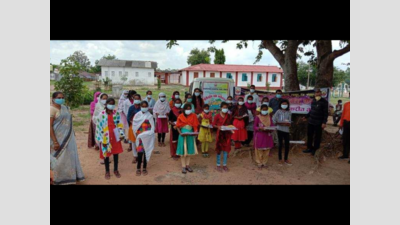- News
- City News
- nagpur News
- In Chandrapur, a school which drives right to tribal homes
Trending
This story is from July 1, 2021
In Chandrapur, a school which drives right to tribal homes
As schools remained closed almost all through last academic session, there were major concerns about children living in remote areas who do not have the option of online education. But a unique pilot project initiated for Eklavya Model Residential School (EMRS) ensured that the enrolled tribal students never fell out of the academic ecosystem.

As part of ‘School On Wheels’ project, two teams reached out to more than 600 students in remote areas to help them continue their studies
NAGPUR: As schools remained closed almost all through last academic session, there were major concerns about children living in remote areas who do not have the option of online education. But a unique pilot project initiated for Eklavya Model Residential School (EMRS) ensured that the enrolled tribal students never fell out of the academic ecosystem.
In many villages of Chandrapur district, teachers rolled into villages in a special car christened ‘School On Wheels’ and brought the classroom right at the doorstep of students.
Under the aegis of state tribal development department (TDD), this pilot project was launched in Devada (Chandrapur district) during July last year. EMRS Devada principal Rupa Borekar said, “The pilot project addresses both, learning and psycho-social needs of 600+ students in extremely remote areas in radii of 50 to 300 km.”
Two teams of staff including the teachers, principal, wardens and non-teaching staff were formed, who then planned visits for six days of the week to designated villages using hired vans. Borekar said, “The vans were equipped with a Covid-19 safety kit, teaching learning material, worksheets, activity sheets, stock of nutritive food items etc. Our teams visited villages in green zones and conducted various activities for about 6 hours every day.”
In some villages that were nearer to urban centres, there were parents who had access to smartphones, which was a blessing for EMRS teachers. “Our teachers formed WhatsApp groups with such parents and were able to keep in touch regarding studies and future visits to the villages. This teacher-parent-student bond strengthened into a community bond, which helped us ensure that all stakeholders were involved equally in the process,” said Borekar.
In many villages of Chandrapur district, teachers rolled into villages in a special car christened ‘School On Wheels’ and brought the classroom right at the doorstep of students.
Under the aegis of state tribal development department (TDD), this pilot project was launched in Devada (Chandrapur district) during July last year. EMRS Devada principal Rupa Borekar said, “The pilot project addresses both, learning and psycho-social needs of 600+ students in extremely remote areas in radii of 50 to 300 km.”
Two teams of staff including the teachers, principal, wardens and non-teaching staff were formed, who then planned visits for six days of the week to designated villages using hired vans. Borekar said, “The vans were equipped with a Covid-19 safety kit, teaching learning material, worksheets, activity sheets, stock of nutritive food items etc. Our teams visited villages in green zones and conducted various activities for about 6 hours every day.”
These activities consisted of awareness sessions regarding the pandemic, curriculum aligned multi-grade teaching, and co-curricular activities with group of 10 to 15 students ensuring safety compliance. Apart from academics, EMRS teachers also taught children about personal hygiene, specifically focussed on preventing Covid-19 infections.
In some villages that were nearer to urban centres, there were parents who had access to smartphones, which was a blessing for EMRS teachers. “Our teachers formed WhatsApp groups with such parents and were able to keep in touch regarding studies and future visits to the villages. This teacher-parent-student bond strengthened into a community bond, which helped us ensure that all stakeholders were involved equally in the process,” said Borekar.
End of Article
FOLLOW US ON SOCIAL MEDIA










